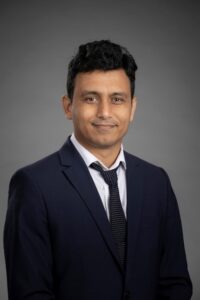Enhancing the Appeal of Thermally Driven Energy Systems: From Synthesis to Demonstration
Speaker: Dr. Darshan Pahinkar - Florida Institute of Technology
Date: Feb 17, 2023; Time: 2:30 PM Location: UTEB 150
 Abstract: The current energy infrastructure is dominated by the combustion of the finite resources of fossil fuels leading to the release of more than 35 billion tons of carbon dioxide (CO2) per year and, in turn, environmental concerns that are intensifying every year. Therefore, there is an urgent need to manage the available primary energy resources judiciously and devise and implement thermally efficient energy systems and infrastructures to minimize electricity consumption and new CO2 emission. These thermally driven energy systems can replace their electricity-driven counterparts for applications involving gas separation, space and water heating, space cooling, refrigeration, and energy storage. They can offer additional advantages such as (a) the absence of moving parts, enhancing durability, (b) the option to use nontoxic, non-flammable working fluids, such as water, and (c) low capital cost. However, the state-of-the-art heat-driven adsorption systems, known as temperature swing adsorption (TSA) systems, must undergo a significant overhaul should the electrically-driven systems be replaced with heat-driven systems. Major bottlenecks in their implementation include sluggish heat and mass transfer in porous packed-bed designs that use large adsorbent pellets and large footprints. Additionally, the low thermal conductivity of the adsorbent materials makes their rapid heating and cooling difficult, which is worsened by the presence of void spaces. As a result, their performance remains poorer than the electrically-driven systems.
Abstract: The current energy infrastructure is dominated by the combustion of the finite resources of fossil fuels leading to the release of more than 35 billion tons of carbon dioxide (CO2) per year and, in turn, environmental concerns that are intensifying every year. Therefore, there is an urgent need to manage the available primary energy resources judiciously and devise and implement thermally efficient energy systems and infrastructures to minimize electricity consumption and new CO2 emission. These thermally driven energy systems can replace their electricity-driven counterparts for applications involving gas separation, space and water heating, space cooling, refrigeration, and energy storage. They can offer additional advantages such as (a) the absence of moving parts, enhancing durability, (b) the option to use nontoxic, non-flammable working fluids, such as water, and (c) low capital cost. However, the state-of-the-art heat-driven adsorption systems, known as temperature swing adsorption (TSA) systems, must undergo a significant overhaul should the electrically-driven systems be replaced with heat-driven systems. Major bottlenecks in their implementation include sluggish heat and mass transfer in porous packed-bed designs that use large adsorbent pellets and large footprints. Additionally, the low thermal conductivity of the adsorbent materials makes their rapid heating and cooling difficult, which is worsened by the presence of void spaces. As a result, their performance remains poorer than the electrically-driven systems.
My talk will explore the design and development of these energy systems from the ground up. I will explore an energy-efficient adsorption heat pump, which uses adsorbent-coated microchannels in detail. Using coated channels results in an operation with a heating time of less than 10% of the total cycle time, opening the possibility for the near-continuous heat pump operation. This highly asymmetric heat pump operation eliminates the primary implementation barrier associated with using an adsorption system in mainstream commercial cooling and heating applications. Silica gel-water pair used in a contactor of the size of a typical refrigerator compressor can provide 300 W of cooling at 5°C with a primary energy COP of 0.25. Tremendous improvement in this performance is possible using high-performance water adsorbents like MIL-101 (Cr). Therefore, along with these feasibility studies, it becomes imperative to understand how to fabricate and characterize these channels and demonstrate their performance through uptake and breakthrough analyses.
Meanwhile, this synthesis step gives rise to several complementary research avenues in particulate flows, additive manufacturing of adsorbent layers, and the rheology of adsorbent slurries, which will be discussed. I will also briefly talk about CO2 capture and thermal energy storage using this technique. A diverse portfolio of such technologies should contribute toward the rise of the sustainable energy landscape in the near future.
Biographical Sketch: Darshan joined Florida Tech as an assistant professor of Mechanical Engineering in the Department of Mechanical and Civil Engineering in Spring 2020. He is the principal investigator of the Adsorption and Energy Technology Lab (AETL) at Florida Tech (https://research.fit.edu/pahinkar/). His research focuses on developing scalable and sustainable energy conversion and storage systems using computational and experimental techniques, characterizing integral fundamental transport phenomena, and demonstrating their practical applications. He advises three Ph.D. and three M.S. students, who lead research on various topics based on these energy systems. Before this appointment, Darshan received his B.E. in Mechanical Engineering from the Government College of Engineering, Pune, India, in 2006 and his M.E. in Mechanical Engineering from the Indian Institute of Science, Bangalore, India, in 2009. For the next two years, he worked as a Manager (Development) in Tata Motors Engineering Research Center, Pune, and his work involved thermal management of automobiles. Darshan graduated with a Ph.D. in Mechanical Engineering from Georgia Tech in the fall of 2016. He was a post-doctoral fellow at Georgia Tech Electronics Manufacturing and Reliability Laboratory before joining Florida Tech.